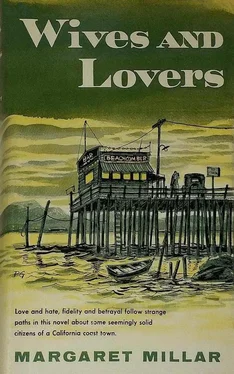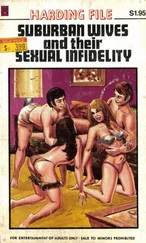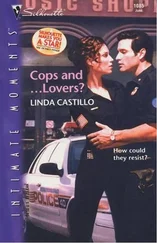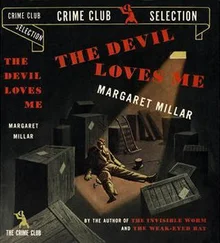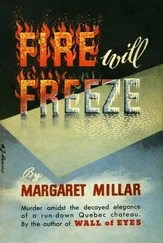On his arrival Elaine noticed his damp hair and reddish eyes, but she also noticed that he didn’t smell of chlorine as he always did after a swim in the pool. She didn’t make any comment to Gordon, she merely noted the discrepancy in the little account book she had kept inside her head for years.
The next night Elaine left the children alone, with a bag of chocolates as solace, and followed Gordon down to Mr. Gomez’s café. Through the window slot in the front door she saw Gordon enter one of the back booths and greet someone who was already there. After the first vicious thrill of triumph — “I was right! I’ve been right all along, absolutely right!” — she felt a dazed incredulity. She had followed the wrong man, it was not Gordon (good old comfortable, steady, hard-working Gordon); and the woman who had followed him, dodging behind bushes and trees pretending to be mailing a letter and looking for a certain house number, was not herself, Elaine, the sincere, virtuous, respectable Elaine she knew and loved so well.
Elaine was, during the first few hours, more appalled at herself than at Gordon. How could I, she thought. How could I, following him like that, peering in that window — what would Mama say if she found out?
Neither Mama, nor Gordon, nor anyone else, found out about Elaine’s trip in the dark. Elaine managed to forget it herself except when Judith referred to it as “the night Mummy left us alone with the chocolates.”
The night of the chocolates, which was for Judith one of her most delightful experiences, was the beginning of what Elaine called her fight for her home and her happiness and the children. She fought indirectly, via the telephone and Mr. Gomez.
The calls infuriated Ruby. “Why can’t she leave us alone? She’s got everything she wants, what’s she griping about? I’m the one should be griping.”
“What’s the matter now, Ruby?”
“I’ve got to move.”
“Why?”
“The old biddy’s found out about us. She told me very politely this morning that she didn’t keep a house and she wasn’t a madam and if I wasn’t out by Thursday morning she’d report me to the police and they’d run me out of town. Nice, eh?”
“She must be crazy to talk like that,” Gordon said, pale with anger. “My God, Ruby, didn’t you defend yourself? Didn’t you talk back?”
“Sure I talked back,” Ruby said dully. “I said I’d move out Thursday morning and that’s all I said because it’s all I could say.”
“But you must have—”
“Well, I didn’t. I want to get out of there, anyway. I don’t even want to go back there tonight. She scares me, Gordon.” She leaned her head on her hands in a picture of weary resignation. “What’s the matter with me tonight? I guess I’m tired. Don’t pay any attention to me. Things are getting so much more mixed up than I thought. I just seem to be making a sort of general mess of everything. Even my new job. You know what Mr. Anderson said to me tonight? He said I was the worst waitress he’d ever seen and I guess he’s right. In the same breath he asked me to go out with him. I said no. Would you be jealous if I did go out with him, Gordon?”
“I suppose I would,” Gordon said soberly. “I don’t know. I’ve never been jealous of anyone before.”
“You wouldn’t. I mean, that’s sort of typical of you. You’re just sort of generally nice, aren’t you?”
Gordon smiled. “Elaine would like to hear that.”
“Don’t talk about her tonight. I’m too tired, I’m so tired I could die. What a job, hauling food around all day. You should see some of them eat. God, people are pigs. It makes me so sick watching them that I never want to eat again.”
“You’ve got to quit that job. I’ll get some money for you. I’ll tell Elaine that—”
He stopped, unable to think of anything to tell Elaine that she would even pretend to believe. Out of the budget Elaine allowed him twenty dollars a week for lunch and incidentals. The budget had always been Elaine’s job — an office budget that covered salaries, rent and new equipment, and one for the household. These budgets invariably balanced, and Gordon was grateful to Elaine for taking over the job and making his money stretch further than he would have been able to do. He had never needed more than twenty dollars a week for himself. Now that he did, the only way he could get it was by more lying. If he cashed a check on their joint account Elaine would find out about it and he would still have to lie.
In the end he wrote out a check for fifty dollars and told Elaine he had lost it on a horse race.
“How could you, Gordon,” Elaine said, with soft reproach, “when you know how we could have used that money! The children are old enough now to perceive things. They see that the Brittons next door have a slide and swing, but they haven’t. And poor Paul has had his heart set on a model airplane with a real motor in it. Or a wading pool. I did so hope we’d be able to manage a wading pool this summer. Well — I won’t nag, Gordon, I hate nagging wives. But I must ask you for the sake of the children to keep within your allowance.”
A little later, while reading the paper, Elaine pointed out to Gordon the picture of an Indian potentate, reputed to be one of the richest men in the world.
“Of course he’d have to be rich,” Elaine said sharply, “in order to be able to afford a harem. ”
Gordon did not defend himself any more than Ruby had when her landlady asked her to leave.
Monday noon, before she left for work, the landlady knocked on her door and when Ruby failed to answer she let herself in with a passkey.
Ruby was sitting on the edge of the bed in her slip, doubled over as if she had a cramp.
“What’s the matter, girl? You sick or something?”
“No.”
“You found a place yet?”
“No. I haven’t had much chance to look.”
“Just so’s you’re out by Thursday. This is the best room in the house and I want—”
“It’s ugly,” Ruby said, without raising her head. “It’s the ugliest room in the world.”
“Mind your tongue or I’ll kick you out right now.”
“My rent’s paid.”
“Girls like you, there’s a place for them and it’s not in any respectable home like this one.”
When the landlady had gone, Ruby got up and opened the closet door. The red fox fur was lying on the shelf, its glass eyes bright as jewels. Her aunt wanted the fur back; she’d written two letters about it, stating that she wanted it to wear at the wedding of a relative of hers. Though Ruby didn’t actually need the fur, she was reluctant to send it back because it reminded her of Gordon and the first night she had arrived in town — it was a symbol of the happy future she had imagined then. To relinquish the fox fur now would be an admission of failure and an acknowledgment that the happy future had already come and gone. She still loved Gordon but not in the pure distilled sense she had at first. Some of the pollutions of circumstance had seeped in, the squalor of her life, the room she’d lived in, the eternal smell of grease in Mr. Gomez’s café, the endless cups of bitter coffee, the endless waiting, the hope that had sickened but refused to die. If she sent the fox fur back she might as well go with it, go home, and never see Gordon again. But at the thought of a world without Gordon her heart contracted in a spasm of fear. She stood for a long time in the dark little clothes closet pressing her face against the red fox and wondering what she could do or say or become to make Gordon love her again.
On Wednesday when she went to work she called Gordon from the pay phone behind the wharf warehouse. He answered the phone himself.
Читать дальше
